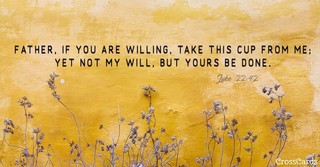- Recent Translations
- All Translations
Lukas 22:36
Share
Settings
Lukas 22:36 Meaning and Commentary
Then said he unto them
That is, Jesus said unto them, as the Persic version expresses it:
but now he that hath a purse let him take it, and likewise his
scrip;
signifying hereby, that from this time forward, immediately after his departure from them, after his death, resurrection, and ascension, when they should be sent into all the world to preach the Gospel, it would be otherwise with them than before; that they should be reduced to great penury and distress, should neither have food, nor money to buy any with; and that they should suffer hunger, and thirst, and nakedness, and have no certain dwellingplace, as was their case; see ( 1 Corinthians 4:11 ) and that they would not be received, and entertained in the manner they had been; and therefore it would be advisable, if they had any provisions, to take them with them in their scrips; or if they had any money, to carry it with them in their purses; for glad would they be to provide themselves with necessaries at any rate:
and he that hath no sword;
the word "sword" is not in this clause, but in the next; it is only in the original, "he that hath not"; which, at first sight; looks as if the sense was, he that hath not a purse, or a scrip, to sell, and buy a sword with, let him sell his garment, and buy one: but, as De Dieu observes, the phrase, "he that hath not", is the same with "he that has nothing"; who is a poor man, and has no money to buy a sword with, let him part with his garment, which rich men, who had money, had no need to do; though the Syriac, Persic, and Arabic versions put the word sword, in both clauses;
he that hath no sword, let him sell his garment and buy a sword;
that is, if he could get one no other way. Christ here uses the common dialect of the nation, as Dr. Lightfoot observes. So on the feast of dedication of the temple,
``if a man had not any thing to eat, but what he had by alms, he must beg, or (wtwok rkwm) , "sell his garment", and take oil, and lamps, and light them F21.''These words of Christ are not to be understood literally, that he would have his disciples furnish themselves with swords at any rate, since he would never have said, as he afterwards does, that two were sufficient; which could not be enough for eleven men; or have forbid Peter the use of one, as he did in a very little time after this: but his meaning is, that wherever they came, and a door was opened for the preaching of the Gospel, they would have many adversaries, and these powerful, and would be used with great violence, and be followed with rage and persecution; so that they might seem to stand in need of swords to defend them: the phrase is expressive of the danger they would be exposed to, and of their need of protection; and therefore it was wrong in them to be disputing and quarrelling about superiority, or looking out for, and expecting temporal pomp and grandeur, when this would be their forlorn, destitute, and afflicted condition; and they would quickly see the affliction and distress begin in himself. In "seven" ancient copies of Beza's, it is read in the future tense, "he shall take, he shall sell, he shall buy".
F21 Maimon. Hilch. Megilla Uchanucha, c. 4. sect. 12.
